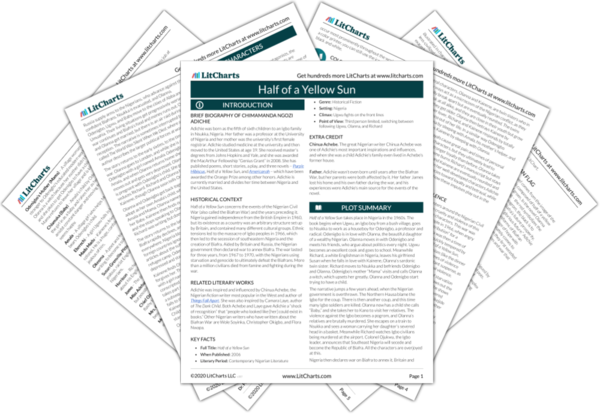Kainene Ozobia Quotes in Half of a Yellow Sun
“The new Nigerian upper class is a collection of illiterates who read nothing and eat food they dislike at overpriced Lebanese restaurants and have social conversations around one subject: ‘How’s the new car behaving?’”
Or she should have told him more: that she regretted betraying Kainene and him but did not regret the act itself. She should have said that it was not a crude revenge, or a scorekeeping, but took on a redemptive significance for her. She should have said the selfishness had liberated her.
“I will never forgive myself if I lose you, Kainene.”
Her face was expressionless. “I took your manuscript from the study this morning and I burned it,” she said.
Richard felt a soar in his chest of emotions he could not name. “The Basket of Hands,” the collection of pages that he was finally confident could become a book, was gone… But it did not matter. What mattered was that by burning the manuscript she had shown him that she would not end the relationship; she would not bother to cause him pain if she was not going to stay. Perhaps he was not a true writer after all. He had read somewhere that, for true writers, nothing was more important than their art, not even love.
“Good?”
“Yes, good. There’s something very lazy about the way you have loved him so blindly for so long without ever criticizing him. You’ve never even accepted that the man is ugly,” Kainene said.
Richard showed them Kainene’s picture. Sometimes, in his rush, he pulled out the picture of the roped pot instead. Nobody had seen her… On the drive back, Richard began to cry.
Madu got up. Richard reached out and grasped his arm. Come back, he wanted to say, come back here and tell me if you ever laid your filthy black hand on her. Madu shrugged Richard’s hand off…
Darkness descended on him, and when it lifted he knew that he would never see Kainene again and that his life would always be like a candlelit room; he would see things only in shadows, only in half glimpses.

Kainene Ozobia Quotes in Half of a Yellow Sun
“The new Nigerian upper class is a collection of illiterates who read nothing and eat food they dislike at overpriced Lebanese restaurants and have social conversations around one subject: ‘How’s the new car behaving?’”
Or she should have told him more: that she regretted betraying Kainene and him but did not regret the act itself. She should have said that it was not a crude revenge, or a scorekeeping, but took on a redemptive significance for her. She should have said the selfishness had liberated her.
“I will never forgive myself if I lose you, Kainene.”
Her face was expressionless. “I took your manuscript from the study this morning and I burned it,” she said.
Richard felt a soar in his chest of emotions he could not name. “The Basket of Hands,” the collection of pages that he was finally confident could become a book, was gone… But it did not matter. What mattered was that by burning the manuscript she had shown him that she would not end the relationship; she would not bother to cause him pain if she was not going to stay. Perhaps he was not a true writer after all. He had read somewhere that, for true writers, nothing was more important than their art, not even love.
“Good?”
“Yes, good. There’s something very lazy about the way you have loved him so blindly for so long without ever criticizing him. You’ve never even accepted that the man is ugly,” Kainene said.
Richard showed them Kainene’s picture. Sometimes, in his rush, he pulled out the picture of the roped pot instead. Nobody had seen her… On the drive back, Richard began to cry.
Madu got up. Richard reached out and grasped his arm. Come back, he wanted to say, come back here and tell me if you ever laid your filthy black hand on her. Madu shrugged Richard’s hand off…
Darkness descended on him, and when it lifted he knew that he would never see Kainene again and that his life would always be like a candlelit room; he would see things only in shadows, only in half glimpses.











